M23 Dissertation: Social Work Support for Parental Substance Misuse
VerifiedAdded on 2023/04/21
|46
|14921
|194
Dissertation
AI Summary
This dissertation explores effective social work interventions for supporting children and families affected by parental substance misuse (PSM). It highlights the prevalence of PSM in the UK, with a significant number of children impacted by parental drug and alcohol use, leading to various issues like neglect, abuse, and long-term emotional and behavioral problems. The research emphasizes the crucial role of social workers in identifying, assessing, and intervening in these situations, despite challenges such as parental resistance and negative stereotypes. It further discusses the importance of providing ongoing support to families and children, focusing on strengths and achievements to sustain positive change. The study uses secondary research to investigate social work strategies and the difficulties encountered while dealing with PSM cases, aiming to contribute to a better understanding of how social workers can effectively support children affected by PSM, and the dissertation includes a research proposal outlining potential future research directions.
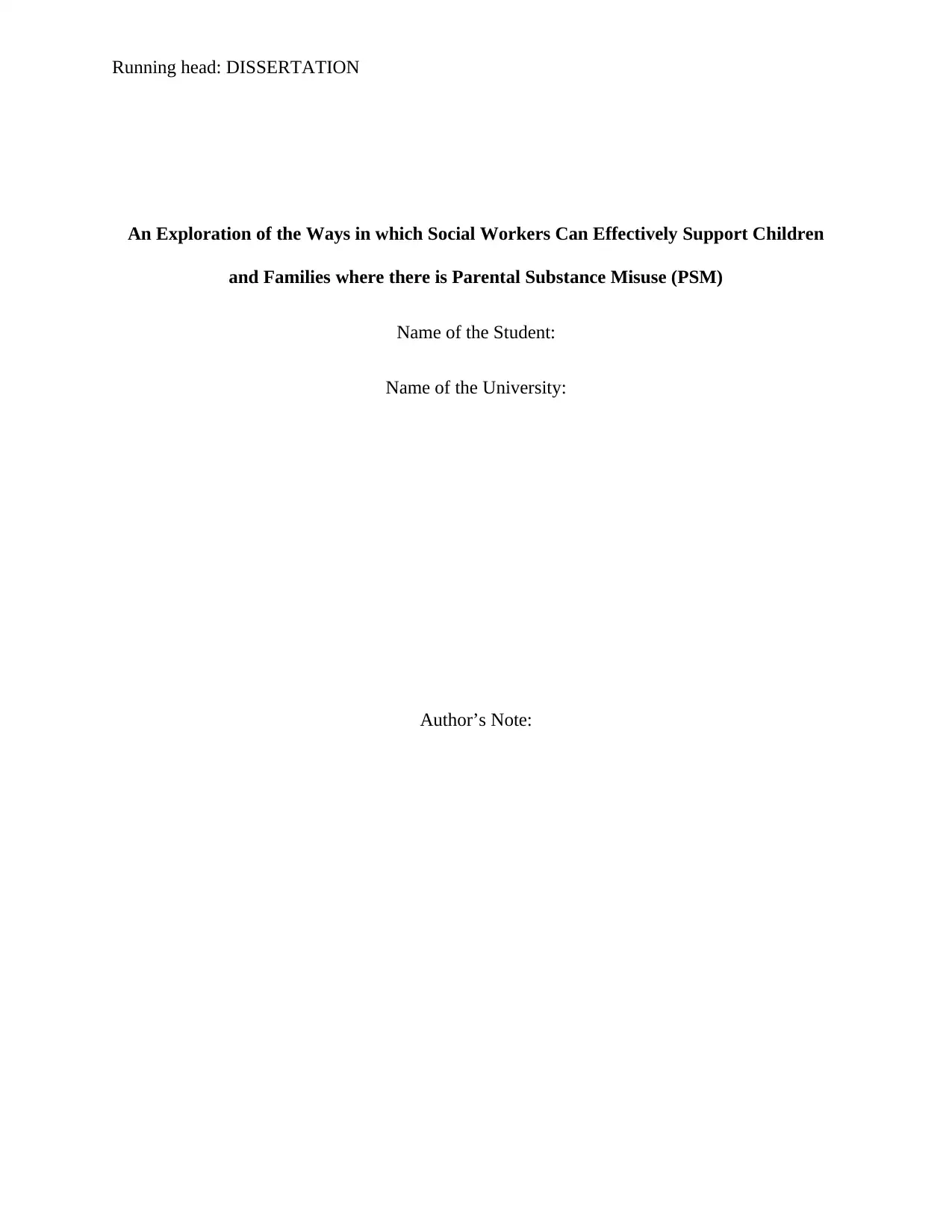
Running head: DISSERTATION
An Exploration of the Ways in which Social Workers Can Effectively Support Children
and Families where there is Parental Substance Misuse (PSM)
Name of the Student:
Name of the University:
Author’s Note:
An Exploration of the Ways in which Social Workers Can Effectively Support Children
and Families where there is Parental Substance Misuse (PSM)
Name of the Student:
Name of the University:
Author’s Note:
Paraphrase This Document
Need a fresh take? Get an instant paraphrase of this document with our AI Paraphraser
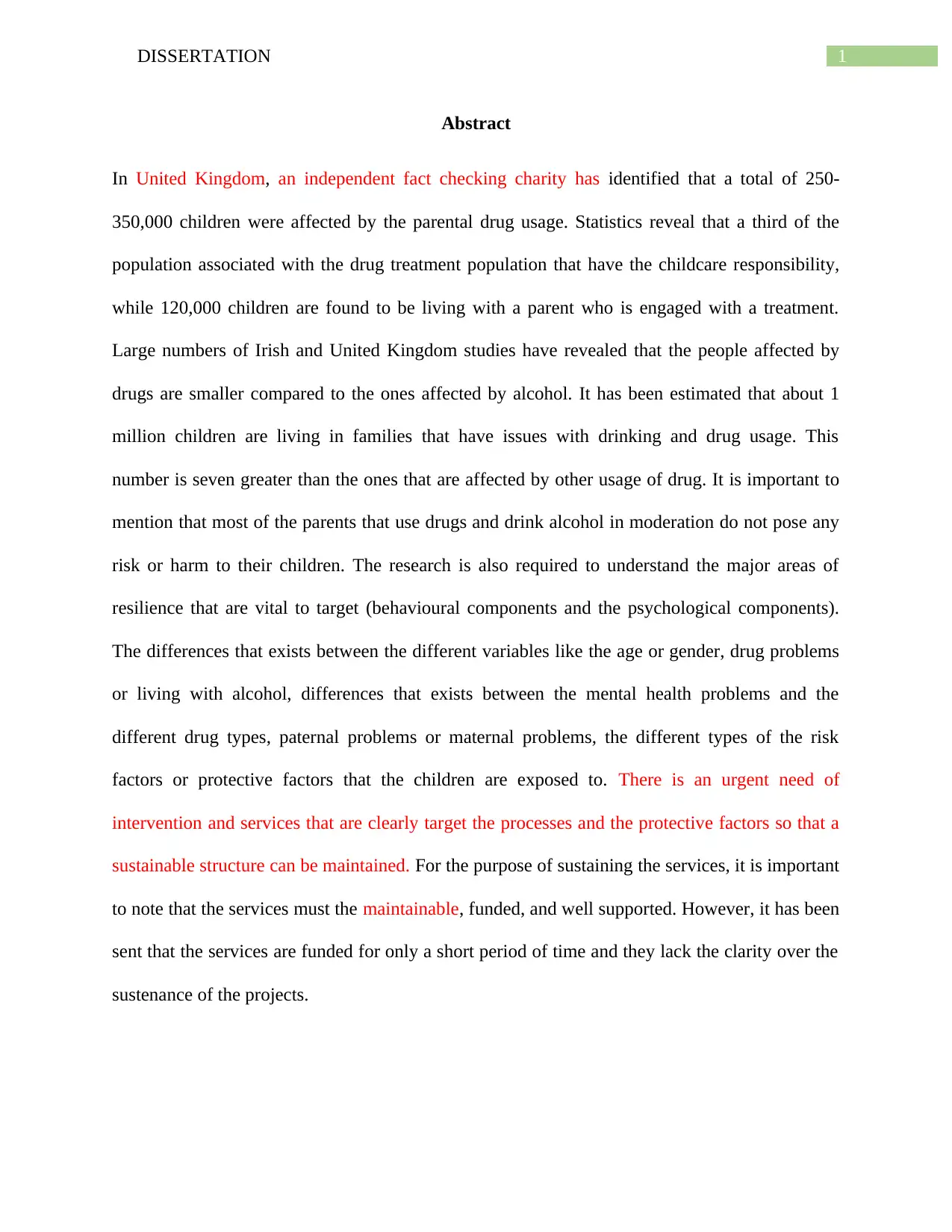
1DISSERTATION
Abstract
In United Kingdom, an independent fact checking charity has identified that a total of 250-
350,000 children were affected by the parental drug usage. Statistics reveal that a third of the
population associated with the drug treatment population that have the childcare responsibility,
while 120,000 children are found to be living with a parent who is engaged with a treatment.
Large numbers of Irish and United Kingdom studies have revealed that the people affected by
drugs are smaller compared to the ones affected by alcohol. It has been estimated that about 1
million children are living in families that have issues with drinking and drug usage. This
number is seven greater than the ones that are affected by other usage of drug. It is important to
mention that most of the parents that use drugs and drink alcohol in moderation do not pose any
risk or harm to their children. The research is also required to understand the major areas of
resilience that are vital to target (behavioural components and the psychological components).
The differences that exists between the different variables like the age or gender, drug problems
or living with alcohol, differences that exists between the mental health problems and the
different drug types, paternal problems or maternal problems, the different types of the risk
factors or protective factors that the children are exposed to. There is an urgent need of
intervention and services that are clearly target the processes and the protective factors so that a
sustainable structure can be maintained. For the purpose of sustaining the services, it is important
to note that the services must the maintainable, funded, and well supported. However, it has been
sent that the services are funded for only a short period of time and they lack the clarity over the
sustenance of the projects.
Abstract
In United Kingdom, an independent fact checking charity has identified that a total of 250-
350,000 children were affected by the parental drug usage. Statistics reveal that a third of the
population associated with the drug treatment population that have the childcare responsibility,
while 120,000 children are found to be living with a parent who is engaged with a treatment.
Large numbers of Irish and United Kingdom studies have revealed that the people affected by
drugs are smaller compared to the ones affected by alcohol. It has been estimated that about 1
million children are living in families that have issues with drinking and drug usage. This
number is seven greater than the ones that are affected by other usage of drug. It is important to
mention that most of the parents that use drugs and drink alcohol in moderation do not pose any
risk or harm to their children. The research is also required to understand the major areas of
resilience that are vital to target (behavioural components and the psychological components).
The differences that exists between the different variables like the age or gender, drug problems
or living with alcohol, differences that exists between the mental health problems and the
different drug types, paternal problems or maternal problems, the different types of the risk
factors or protective factors that the children are exposed to. There is an urgent need of
intervention and services that are clearly target the processes and the protective factors so that a
sustainable structure can be maintained. For the purpose of sustaining the services, it is important
to note that the services must the maintainable, funded, and well supported. However, it has been
sent that the services are funded for only a short period of time and they lack the clarity over the
sustenance of the projects.
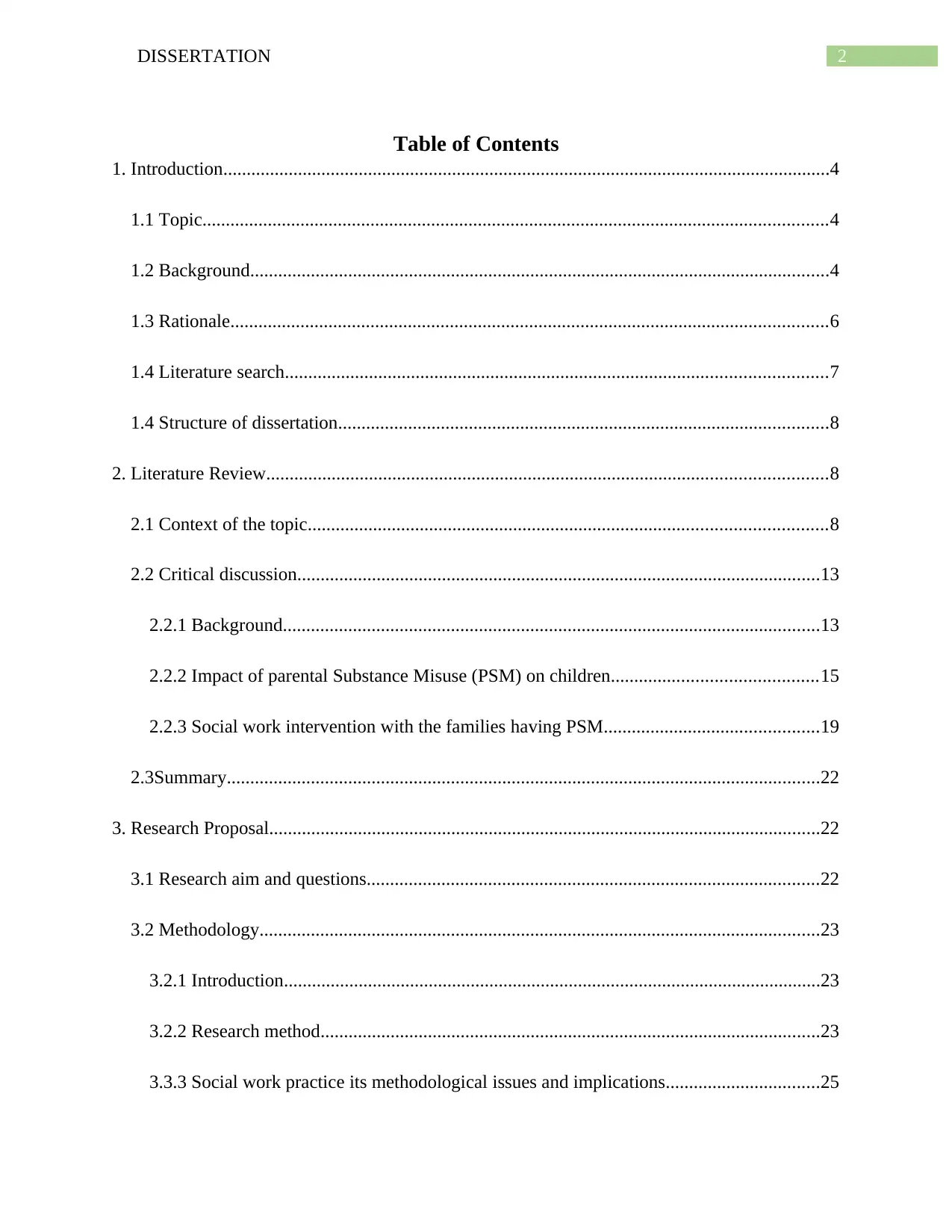
2DISSERTATION
Table of Contents
1. Introduction..................................................................................................................................4
1.1 Topic......................................................................................................................................4
1.2 Background............................................................................................................................4
1.3 Rationale................................................................................................................................6
1.4 Literature search....................................................................................................................7
1.4 Structure of dissertation.........................................................................................................8
2. Literature Review........................................................................................................................8
2.1 Context of the topic...............................................................................................................8
2.2 Critical discussion................................................................................................................13
2.2.1 Background...................................................................................................................13
2.2.2 Impact of parental Substance Misuse (PSM) on children............................................15
2.2.3 Social work intervention with the families having PSM..............................................19
2.3Summary...............................................................................................................................22
3. Research Proposal......................................................................................................................22
3.1 Research aim and questions.................................................................................................22
3.2 Methodology........................................................................................................................23
3.2.1 Introduction...................................................................................................................23
3.2.2 Research method...........................................................................................................23
3.3.3 Social work practice its methodological issues and implications.................................25
Table of Contents
1. Introduction..................................................................................................................................4
1.1 Topic......................................................................................................................................4
1.2 Background............................................................................................................................4
1.3 Rationale................................................................................................................................6
1.4 Literature search....................................................................................................................7
1.4 Structure of dissertation.........................................................................................................8
2. Literature Review........................................................................................................................8
2.1 Context of the topic...............................................................................................................8
2.2 Critical discussion................................................................................................................13
2.2.1 Background...................................................................................................................13
2.2.2 Impact of parental Substance Misuse (PSM) on children............................................15
2.2.3 Social work intervention with the families having PSM..............................................19
2.3Summary...............................................................................................................................22
3. Research Proposal......................................................................................................................22
3.1 Research aim and questions.................................................................................................22
3.2 Methodology........................................................................................................................23
3.2.1 Introduction...................................................................................................................23
3.2.2 Research method...........................................................................................................23
3.3.3 Social work practice its methodological issues and implications.................................25
⊘ This is a preview!⊘
Do you want full access?
Subscribe today to unlock all pages.

Trusted by 1+ million students worldwide
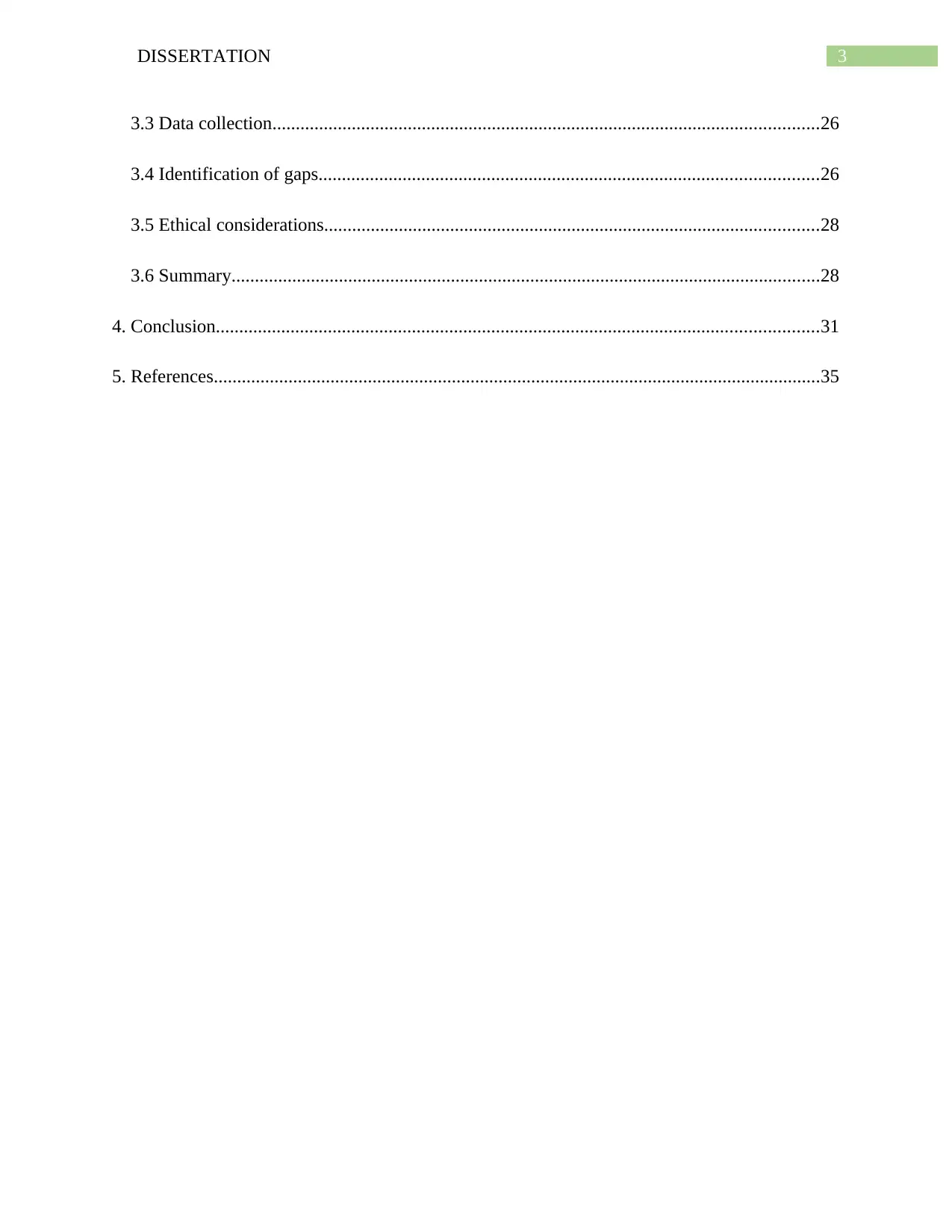
3DISSERTATION
3.3 Data collection.....................................................................................................................26
3.4 Identification of gaps...........................................................................................................26
3.5 Ethical considerations..........................................................................................................28
3.6 Summary..............................................................................................................................28
4. Conclusion.................................................................................................................................31
5. References..................................................................................................................................35
3.3 Data collection.....................................................................................................................26
3.4 Identification of gaps...........................................................................................................26
3.5 Ethical considerations..........................................................................................................28
3.6 Summary..............................................................................................................................28
4. Conclusion.................................................................................................................................31
5. References..................................................................................................................................35
Paraphrase This Document
Need a fresh take? Get an instant paraphrase of this document with our AI Paraphraser
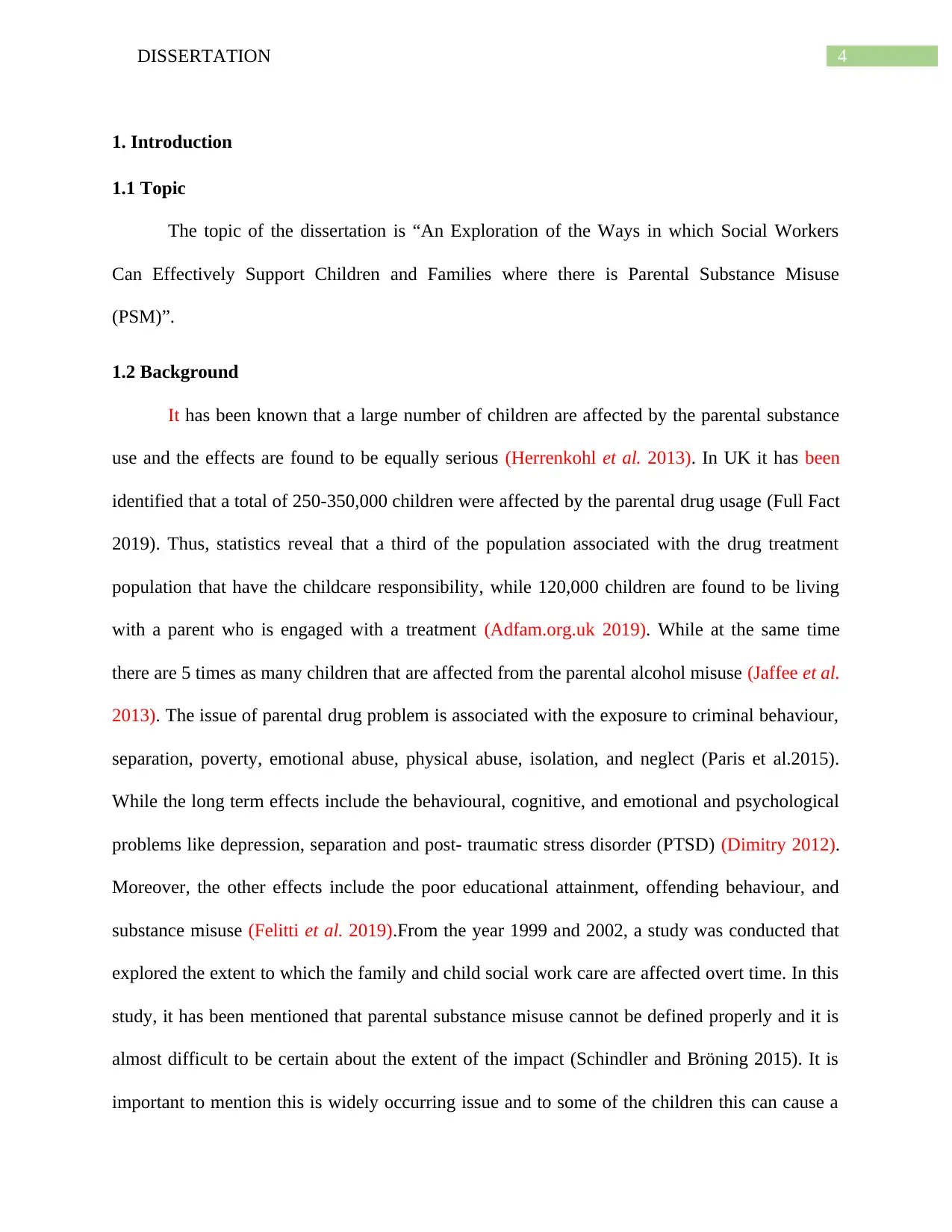
4DISSERTATION
1. Introduction
1.1 Topic
The topic of the dissertation is “An Exploration of the Ways in which Social Workers
Can Effectively Support Children and Families where there is Parental Substance Misuse
(PSM)”.
1.2 Background
It has been known that a large number of children are affected by the parental substance
use and the effects are found to be equally serious (Herrenkohl et al. 2013). In UK it has been
identified that a total of 250-350,000 children were affected by the parental drug usage (Full Fact
2019). Thus, statistics reveal that a third of the population associated with the drug treatment
population that have the childcare responsibility, while 120,000 children are found to be living
with a parent who is engaged with a treatment (Adfam.org.uk 2019). While at the same time
there are 5 times as many children that are affected from the parental alcohol misuse (Jaffee et al.
2013). The issue of parental drug problem is associated with the exposure to criminal behaviour,
separation, poverty, emotional abuse, physical abuse, isolation, and neglect (Paris et al.2015).
While the long term effects include the behavioural, cognitive, and emotional and psychological
problems like depression, separation and post- traumatic stress disorder (PTSD) (Dimitry 2012).
Moreover, the other effects include the poor educational attainment, offending behaviour, and
substance misuse (Felitti et al. 2019).From the year 1999 and 2002, a study was conducted that
explored the extent to which the family and child social work care are affected overt time. In this
study, it has been mentioned that parental substance misuse cannot be defined properly and it is
almost difficult to be certain about the extent of the impact (Schindler and Bröning 2015). It is
important to mention this is widely occurring issue and to some of the children this can cause a
1. Introduction
1.1 Topic
The topic of the dissertation is “An Exploration of the Ways in which Social Workers
Can Effectively Support Children and Families where there is Parental Substance Misuse
(PSM)”.
1.2 Background
It has been known that a large number of children are affected by the parental substance
use and the effects are found to be equally serious (Herrenkohl et al. 2013). In UK it has been
identified that a total of 250-350,000 children were affected by the parental drug usage (Full Fact
2019). Thus, statistics reveal that a third of the population associated with the drug treatment
population that have the childcare responsibility, while 120,000 children are found to be living
with a parent who is engaged with a treatment (Adfam.org.uk 2019). While at the same time
there are 5 times as many children that are affected from the parental alcohol misuse (Jaffee et al.
2013). The issue of parental drug problem is associated with the exposure to criminal behaviour,
separation, poverty, emotional abuse, physical abuse, isolation, and neglect (Paris et al.2015).
While the long term effects include the behavioural, cognitive, and emotional and psychological
problems like depression, separation and post- traumatic stress disorder (PTSD) (Dimitry 2012).
Moreover, the other effects include the poor educational attainment, offending behaviour, and
substance misuse (Felitti et al. 2019).From the year 1999 and 2002, a study was conducted that
explored the extent to which the family and child social work care are affected overt time. In this
study, it has been mentioned that parental substance misuse cannot be defined properly and it is
almost difficult to be certain about the extent of the impact (Schindler and Bröning 2015). It is
important to mention this is widely occurring issue and to some of the children this can cause a
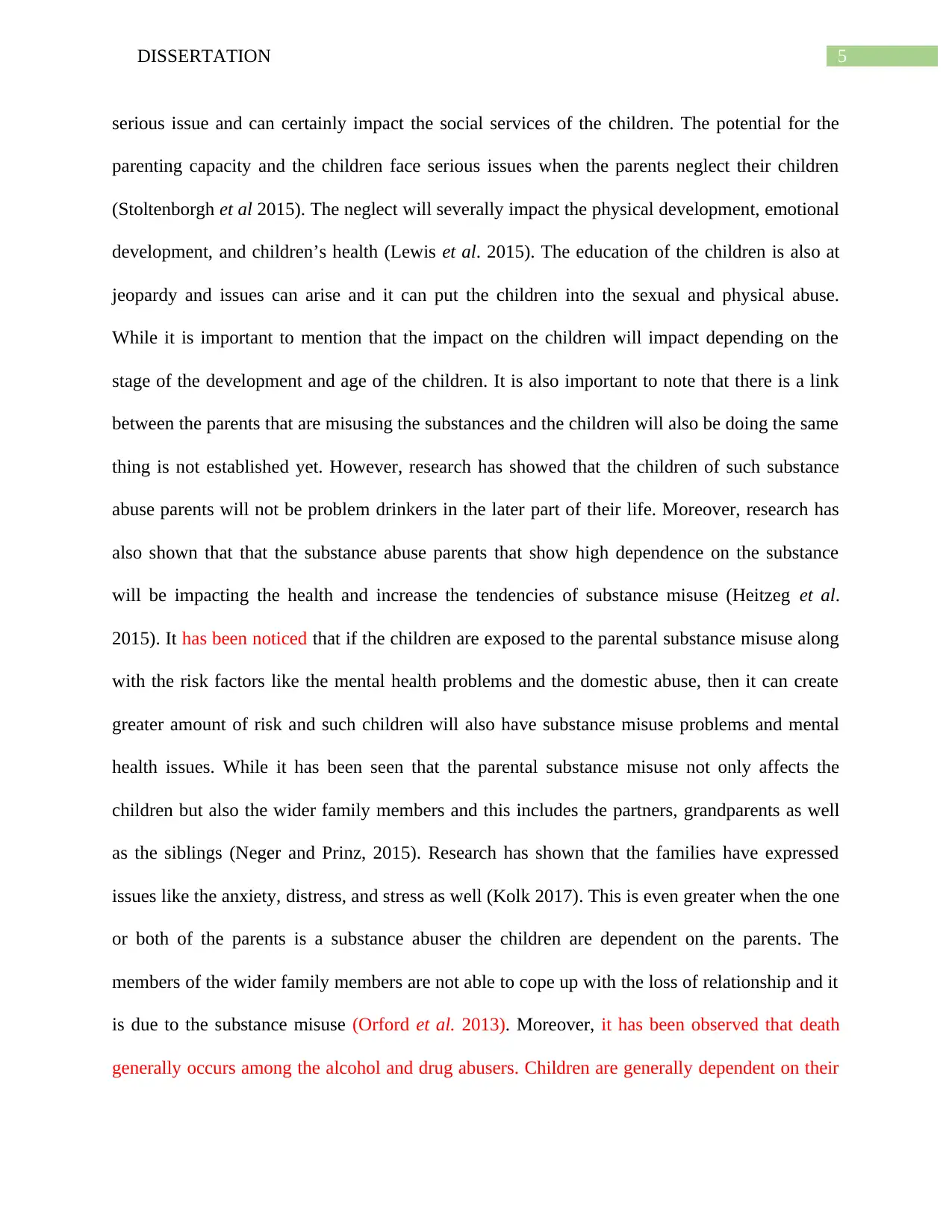
5DISSERTATION
serious issue and can certainly impact the social services of the children. The potential for the
parenting capacity and the children face serious issues when the parents neglect their children
(Stoltenborgh et al 2015). The neglect will severally impact the physical development, emotional
development, and children’s health (Lewis et al. 2015). The education of the children is also at
jeopardy and issues can arise and it can put the children into the sexual and physical abuse.
While it is important to mention that the impact on the children will impact depending on the
stage of the development and age of the children. It is also important to note that there is a link
between the parents that are misusing the substances and the children will also be doing the same
thing is not established yet. However, research has showed that the children of such substance
abuse parents will not be problem drinkers in the later part of their life. Moreover, research has
also shown that that the substance abuse parents that show high dependence on the substance
will be impacting the health and increase the tendencies of substance misuse (Heitzeg et al.
2015). It has been noticed that if the children are exposed to the parental substance misuse along
with the risk factors like the mental health problems and the domestic abuse, then it can create
greater amount of risk and such children will also have substance misuse problems and mental
health issues. While it has been seen that the parental substance misuse not only affects the
children but also the wider family members and this includes the partners, grandparents as well
as the siblings (Neger and Prinz, 2015). Research has shown that the families have expressed
issues like the anxiety, distress, and stress as well (Kolk 2017). This is even greater when the one
or both of the parents is a substance abuser the children are dependent on the parents. The
members of the wider family members are not able to cope up with the loss of relationship and it
is due to the substance misuse (Orford et al. 2013). Moreover, it has been observed that death
generally occurs among the alcohol and drug abusers. Children are generally dependent on their
serious issue and can certainly impact the social services of the children. The potential for the
parenting capacity and the children face serious issues when the parents neglect their children
(Stoltenborgh et al 2015). The neglect will severally impact the physical development, emotional
development, and children’s health (Lewis et al. 2015). The education of the children is also at
jeopardy and issues can arise and it can put the children into the sexual and physical abuse.
While it is important to mention that the impact on the children will impact depending on the
stage of the development and age of the children. It is also important to note that there is a link
between the parents that are misusing the substances and the children will also be doing the same
thing is not established yet. However, research has showed that the children of such substance
abuse parents will not be problem drinkers in the later part of their life. Moreover, research has
also shown that that the substance abuse parents that show high dependence on the substance
will be impacting the health and increase the tendencies of substance misuse (Heitzeg et al.
2015). It has been noticed that if the children are exposed to the parental substance misuse along
with the risk factors like the mental health problems and the domestic abuse, then it can create
greater amount of risk and such children will also have substance misuse problems and mental
health issues. While it has been seen that the parental substance misuse not only affects the
children but also the wider family members and this includes the partners, grandparents as well
as the siblings (Neger and Prinz, 2015). Research has shown that the families have expressed
issues like the anxiety, distress, and stress as well (Kolk 2017). This is even greater when the one
or both of the parents is a substance abuser the children are dependent on the parents. The
members of the wider family members are not able to cope up with the loss of relationship and it
is due to the substance misuse (Orford et al. 2013). Moreover, it has been observed that death
generally occurs among the alcohol and drug abusers. Children are generally dependent on their
⊘ This is a preview!⊘
Do you want full access?
Subscribe today to unlock all pages.

Trusted by 1+ million students worldwide
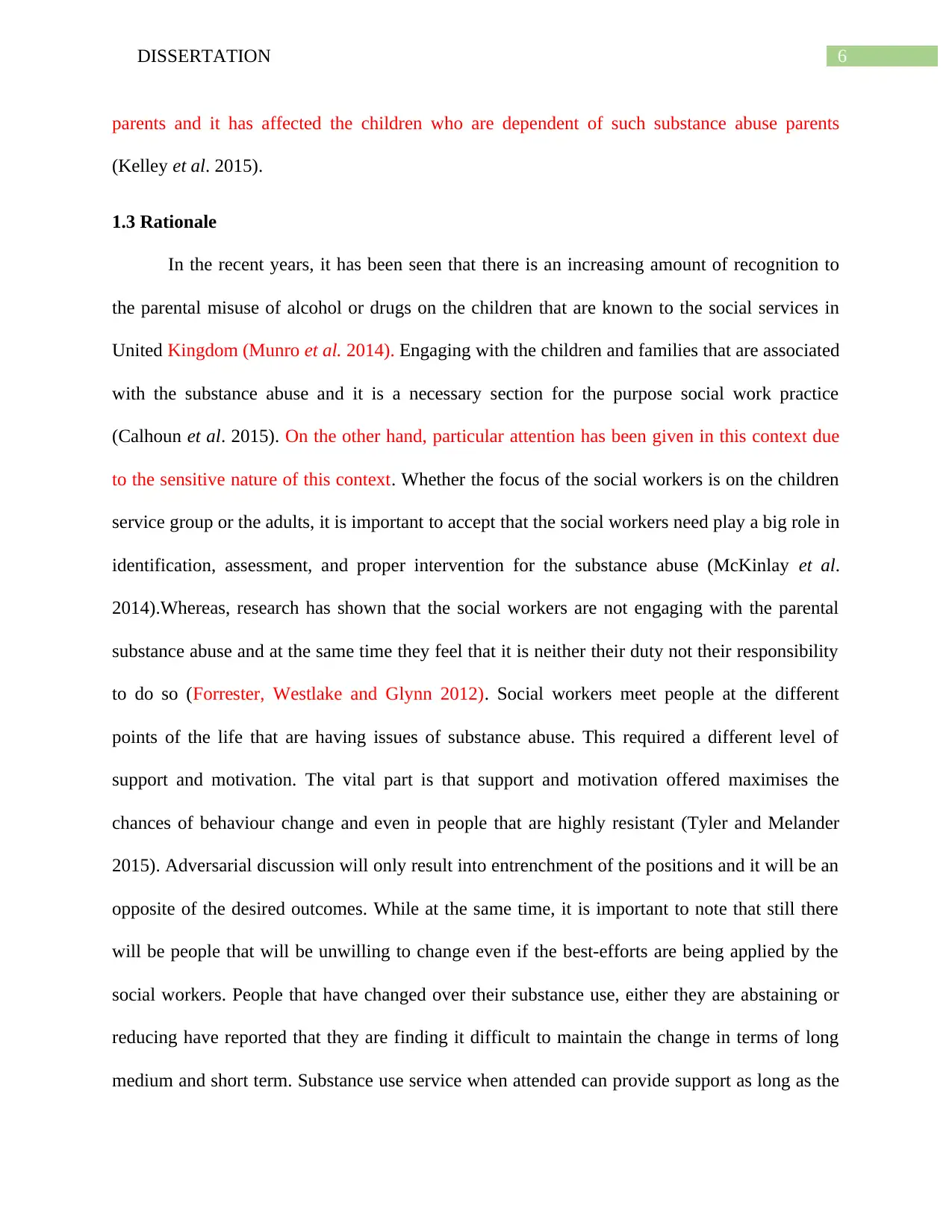
6DISSERTATION
parents and it has affected the children who are dependent of such substance abuse parents
(Kelley et al. 2015).
1.3 Rationale
In the recent years, it has been seen that there is an increasing amount of recognition to
the parental misuse of alcohol or drugs on the children that are known to the social services in
United Kingdom (Munro et al. 2014). Engaging with the children and families that are associated
with the substance abuse and it is a necessary section for the purpose social work practice
(Calhoun et al. 2015). On the other hand, particular attention has been given in this context due
to the sensitive nature of this context. Whether the focus of the social workers is on the children
service group or the adults, it is important to accept that the social workers need play a big role in
identification, assessment, and proper intervention for the substance abuse (McKinlay et al.
2014).Whereas, research has shown that the social workers are not engaging with the parental
substance abuse and at the same time they feel that it is neither their duty not their responsibility
to do so (Forrester, Westlake and Glynn 2012). Social workers meet people at the different
points of the life that are having issues of substance abuse. This required a different level of
support and motivation. The vital part is that support and motivation offered maximises the
chances of behaviour change and even in people that are highly resistant (Tyler and Melander
2015). Adversarial discussion will only result into entrenchment of the positions and it will be an
opposite of the desired outcomes. While at the same time, it is important to note that still there
will be people that will be unwilling to change even if the best-efforts are being applied by the
social workers. People that have changed over their substance use, either they are abstaining or
reducing have reported that they are finding it difficult to maintain the change in terms of long
medium and short term. Substance use service when attended can provide support as long as the
parents and it has affected the children who are dependent of such substance abuse parents
(Kelley et al. 2015).
1.3 Rationale
In the recent years, it has been seen that there is an increasing amount of recognition to
the parental misuse of alcohol or drugs on the children that are known to the social services in
United Kingdom (Munro et al. 2014). Engaging with the children and families that are associated
with the substance abuse and it is a necessary section for the purpose social work practice
(Calhoun et al. 2015). On the other hand, particular attention has been given in this context due
to the sensitive nature of this context. Whether the focus of the social workers is on the children
service group or the adults, it is important to accept that the social workers need play a big role in
identification, assessment, and proper intervention for the substance abuse (McKinlay et al.
2014).Whereas, research has shown that the social workers are not engaging with the parental
substance abuse and at the same time they feel that it is neither their duty not their responsibility
to do so (Forrester, Westlake and Glynn 2012). Social workers meet people at the different
points of the life that are having issues of substance abuse. This required a different level of
support and motivation. The vital part is that support and motivation offered maximises the
chances of behaviour change and even in people that are highly resistant (Tyler and Melander
2015). Adversarial discussion will only result into entrenchment of the positions and it will be an
opposite of the desired outcomes. While at the same time, it is important to note that still there
will be people that will be unwilling to change even if the best-efforts are being applied by the
social workers. People that have changed over their substance use, either they are abstaining or
reducing have reported that they are finding it difficult to maintain the change in terms of long
medium and short term. Substance use service when attended can provide support as long as the
Paraphrase This Document
Need a fresh take? Get an instant paraphrase of this document with our AI Paraphraser
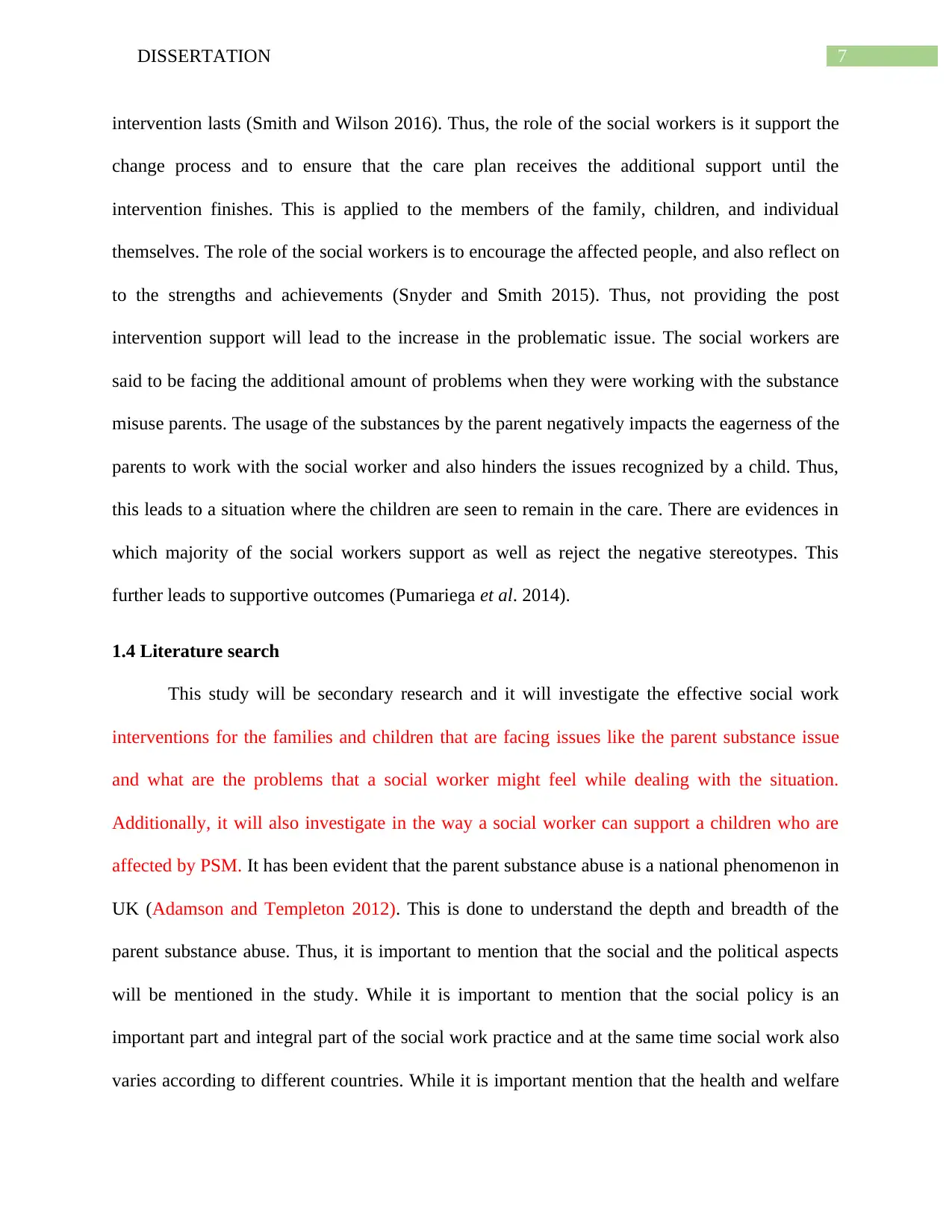
7DISSERTATION
intervention lasts (Smith and Wilson 2016). Thus, the role of the social workers is it support the
change process and to ensure that the care plan receives the additional support until the
intervention finishes. This is applied to the members of the family, children, and individual
themselves. The role of the social workers is to encourage the affected people, and also reflect on
to the strengths and achievements (Snyder and Smith 2015). Thus, not providing the post
intervention support will lead to the increase in the problematic issue. The social workers are
said to be facing the additional amount of problems when they were working with the substance
misuse parents. The usage of the substances by the parent negatively impacts the eagerness of the
parents to work with the social worker and also hinders the issues recognized by a child. Thus,
this leads to a situation where the children are seen to remain in the care. There are evidences in
which majority of the social workers support as well as reject the negative stereotypes. This
further leads to supportive outcomes (Pumariega et al. 2014).
1.4 Literature search
This study will be secondary research and it will investigate the effective social work
interventions for the families and children that are facing issues like the parent substance issue
and what are the problems that a social worker might feel while dealing with the situation.
Additionally, it will also investigate in the way a social worker can support a children who are
affected by PSM. It has been evident that the parent substance abuse is a national phenomenon in
UK (Adamson and Templeton 2012). This is done to understand the depth and breadth of the
parent substance abuse. Thus, it is important to mention that the social and the political aspects
will be mentioned in the study. While it is important to mention that the social policy is an
important part and integral part of the social work practice and at the same time social work also
varies according to different countries. While it is important mention that the health and welfare
intervention lasts (Smith and Wilson 2016). Thus, the role of the social workers is it support the
change process and to ensure that the care plan receives the additional support until the
intervention finishes. This is applied to the members of the family, children, and individual
themselves. The role of the social workers is to encourage the affected people, and also reflect on
to the strengths and achievements (Snyder and Smith 2015). Thus, not providing the post
intervention support will lead to the increase in the problematic issue. The social workers are
said to be facing the additional amount of problems when they were working with the substance
misuse parents. The usage of the substances by the parent negatively impacts the eagerness of the
parents to work with the social worker and also hinders the issues recognized by a child. Thus,
this leads to a situation where the children are seen to remain in the care. There are evidences in
which majority of the social workers support as well as reject the negative stereotypes. This
further leads to supportive outcomes (Pumariega et al. 2014).
1.4 Literature search
This study will be secondary research and it will investigate the effective social work
interventions for the families and children that are facing issues like the parent substance issue
and what are the problems that a social worker might feel while dealing with the situation.
Additionally, it will also investigate in the way a social worker can support a children who are
affected by PSM. It has been evident that the parent substance abuse is a national phenomenon in
UK (Adamson and Templeton 2012). This is done to understand the depth and breadth of the
parent substance abuse. Thus, it is important to mention that the social and the political aspects
will be mentioned in the study. While it is important to mention that the social policy is an
important part and integral part of the social work practice and at the same time social work also
varies according to different countries. While it is important mention that the health and welfare
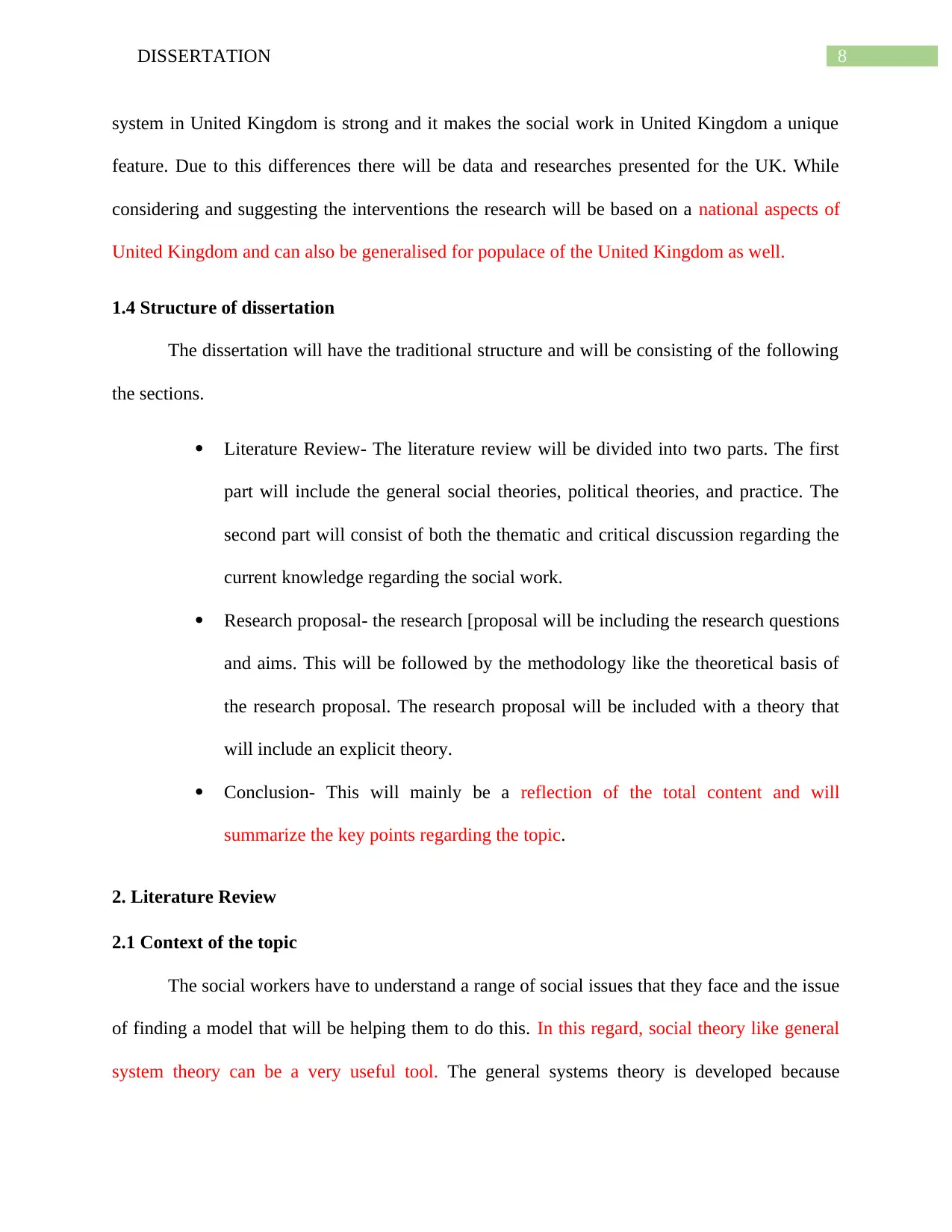
8DISSERTATION
system in United Kingdom is strong and it makes the social work in United Kingdom a unique
feature. Due to this differences there will be data and researches presented for the UK. While
considering and suggesting the interventions the research will be based on a national aspects of
United Kingdom and can also be generalised for populace of the United Kingdom as well.
1.4 Structure of dissertation
The dissertation will have the traditional structure and will be consisting of the following
the sections.
Literature Review- The literature review will be divided into two parts. The first
part will include the general social theories, political theories, and practice. The
second part will consist of both the thematic and critical discussion regarding the
current knowledge regarding the social work.
Research proposal- the research [proposal will be including the research questions
and aims. This will be followed by the methodology like the theoretical basis of
the research proposal. The research proposal will be included with a theory that
will include an explicit theory.
Conclusion- This will mainly be a reflection of the total content and will
summarize the key points regarding the topic.
2. Literature Review
2.1 Context of the topic
The social workers have to understand a range of social issues that they face and the issue
of finding a model that will be helping them to do this. In this regard, social theory like general
system theory can be a very useful tool. The general systems theory is developed because
system in United Kingdom is strong and it makes the social work in United Kingdom a unique
feature. Due to this differences there will be data and researches presented for the UK. While
considering and suggesting the interventions the research will be based on a national aspects of
United Kingdom and can also be generalised for populace of the United Kingdom as well.
1.4 Structure of dissertation
The dissertation will have the traditional structure and will be consisting of the following
the sections.
Literature Review- The literature review will be divided into two parts. The first
part will include the general social theories, political theories, and practice. The
second part will consist of both the thematic and critical discussion regarding the
current knowledge regarding the social work.
Research proposal- the research [proposal will be including the research questions
and aims. This will be followed by the methodology like the theoretical basis of
the research proposal. The research proposal will be included with a theory that
will include an explicit theory.
Conclusion- This will mainly be a reflection of the total content and will
summarize the key points regarding the topic.
2. Literature Review
2.1 Context of the topic
The social workers have to understand a range of social issues that they face and the issue
of finding a model that will be helping them to do this. In this regard, social theory like general
system theory can be a very useful tool. The general systems theory is developed because
⊘ This is a preview!⊘
Do you want full access?
Subscribe today to unlock all pages.

Trusted by 1+ million students worldwide
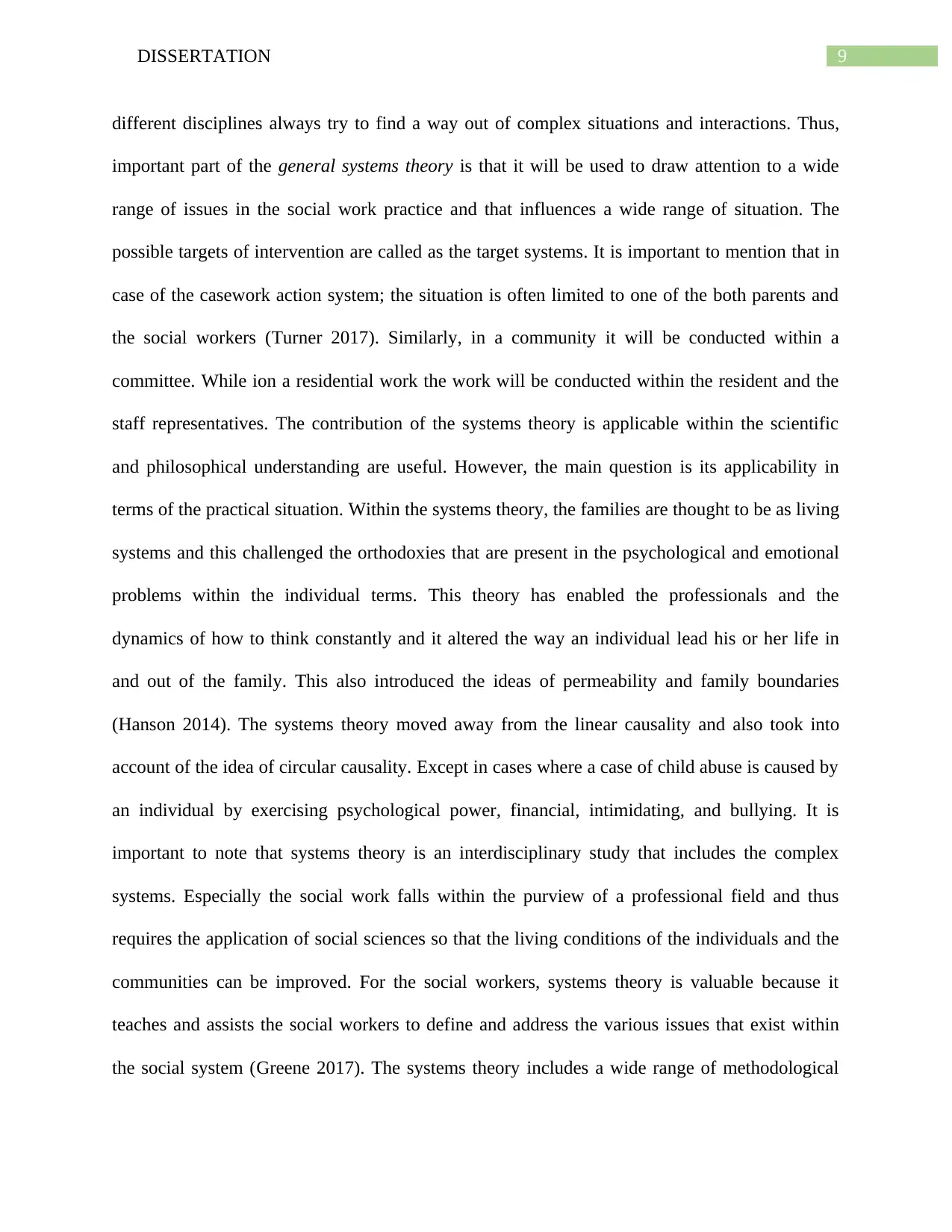
9DISSERTATION
different disciplines always try to find a way out of complex situations and interactions. Thus,
important part of the general systems theory is that it will be used to draw attention to a wide
range of issues in the social work practice and that influences a wide range of situation. The
possible targets of intervention are called as the target systems. It is important to mention that in
case of the casework action system; the situation is often limited to one of the both parents and
the social workers (Turner 2017). Similarly, in a community it will be conducted within a
committee. While ion a residential work the work will be conducted within the resident and the
staff representatives. The contribution of the systems theory is applicable within the scientific
and philosophical understanding are useful. However, the main question is its applicability in
terms of the practical situation. Within the systems theory, the families are thought to be as living
systems and this challenged the orthodoxies that are present in the psychological and emotional
problems within the individual terms. This theory has enabled the professionals and the
dynamics of how to think constantly and it altered the way an individual lead his or her life in
and out of the family. This also introduced the ideas of permeability and family boundaries
(Hanson 2014). The systems theory moved away from the linear causality and also took into
account of the idea of circular causality. Except in cases where a case of child abuse is caused by
an individual by exercising psychological power, financial, intimidating, and bullying. It is
important to note that systems theory is an interdisciplinary study that includes the complex
systems. Especially the social work falls within the purview of a professional field and thus
requires the application of social sciences so that the living conditions of the individuals and the
communities can be improved. For the social workers, systems theory is valuable because it
teaches and assists the social workers to define and address the various issues that exist within
the social system (Greene 2017). The systems theory includes a wide range of methodological
different disciplines always try to find a way out of complex situations and interactions. Thus,
important part of the general systems theory is that it will be used to draw attention to a wide
range of issues in the social work practice and that influences a wide range of situation. The
possible targets of intervention are called as the target systems. It is important to mention that in
case of the casework action system; the situation is often limited to one of the both parents and
the social workers (Turner 2017). Similarly, in a community it will be conducted within a
committee. While ion a residential work the work will be conducted within the resident and the
staff representatives. The contribution of the systems theory is applicable within the scientific
and philosophical understanding are useful. However, the main question is its applicability in
terms of the practical situation. Within the systems theory, the families are thought to be as living
systems and this challenged the orthodoxies that are present in the psychological and emotional
problems within the individual terms. This theory has enabled the professionals and the
dynamics of how to think constantly and it altered the way an individual lead his or her life in
and out of the family. This also introduced the ideas of permeability and family boundaries
(Hanson 2014). The systems theory moved away from the linear causality and also took into
account of the idea of circular causality. Except in cases where a case of child abuse is caused by
an individual by exercising psychological power, financial, intimidating, and bullying. It is
important to note that systems theory is an interdisciplinary study that includes the complex
systems. Especially the social work falls within the purview of a professional field and thus
requires the application of social sciences so that the living conditions of the individuals and the
communities can be improved. For the social workers, systems theory is valuable because it
teaches and assists the social workers to define and address the various issues that exist within
the social system (Greene 2017). The systems theory includes a wide range of methodological
Paraphrase This Document
Need a fresh take? Get an instant paraphrase of this document with our AI Paraphraser
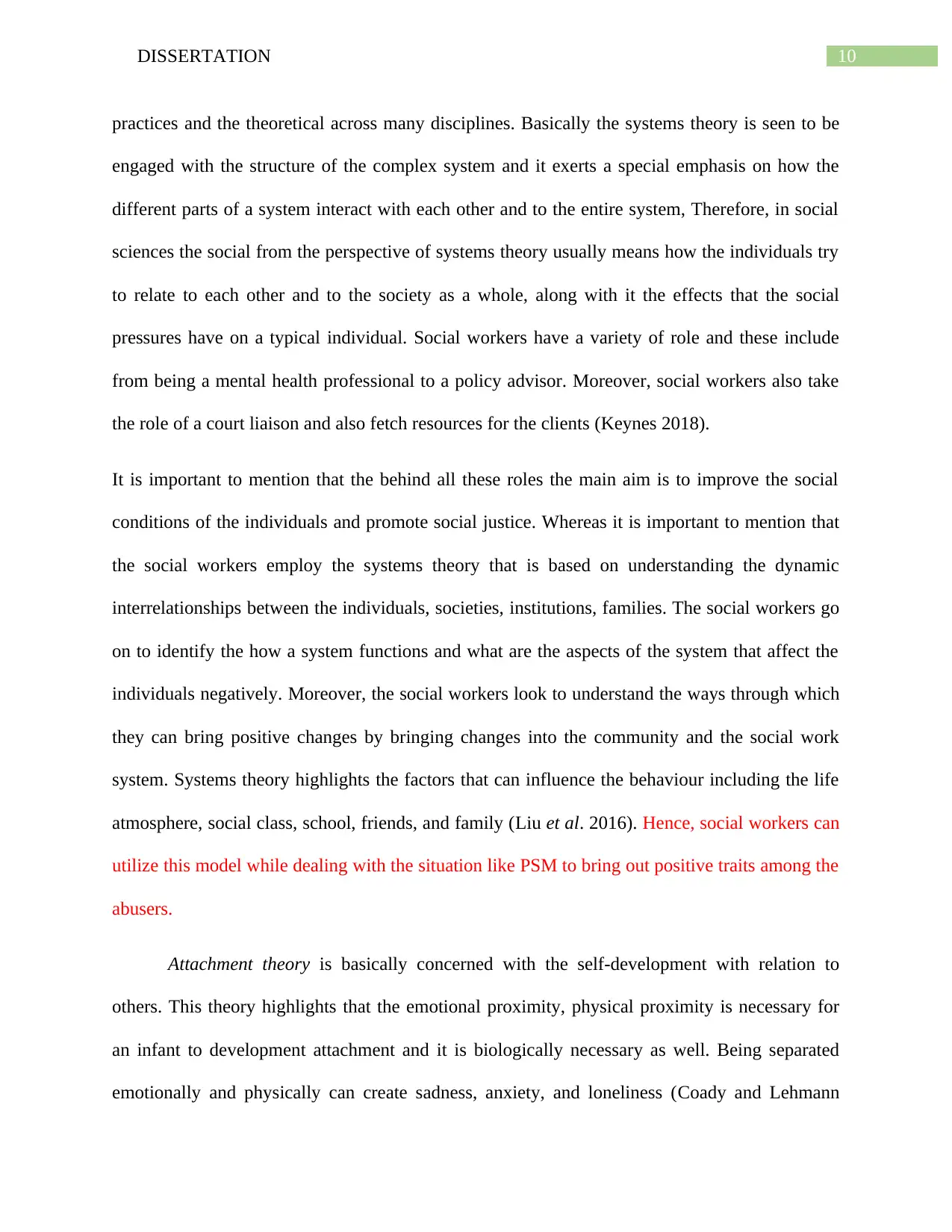
10DISSERTATION
practices and the theoretical across many disciplines. Basically the systems theory is seen to be
engaged with the structure of the complex system and it exerts a special emphasis on how the
different parts of a system interact with each other and to the entire system, Therefore, in social
sciences the social from the perspective of systems theory usually means how the individuals try
to relate to each other and to the society as a whole, along with it the effects that the social
pressures have on a typical individual. Social workers have a variety of role and these include
from being a mental health professional to a policy advisor. Moreover, social workers also take
the role of a court liaison and also fetch resources for the clients (Keynes 2018).
It is important to mention that the behind all these roles the main aim is to improve the social
conditions of the individuals and promote social justice. Whereas it is important to mention that
the social workers employ the systems theory that is based on understanding the dynamic
interrelationships between the individuals, societies, institutions, families. The social workers go
on to identify the how a system functions and what are the aspects of the system that affect the
individuals negatively. Moreover, the social workers look to understand the ways through which
they can bring positive changes by bringing changes into the community and the social work
system. Systems theory highlights the factors that can influence the behaviour including the life
atmosphere, social class, school, friends, and family (Liu et al. 2016). Hence, social workers can
utilize this model while dealing with the situation like PSM to bring out positive traits among the
abusers.
Attachment theory is basically concerned with the self-development with relation to
others. This theory highlights that the emotional proximity, physical proximity is necessary for
an infant to development attachment and it is biologically necessary as well. Being separated
emotionally and physically can create sadness, anxiety, and loneliness (Coady and Lehmann
practices and the theoretical across many disciplines. Basically the systems theory is seen to be
engaged with the structure of the complex system and it exerts a special emphasis on how the
different parts of a system interact with each other and to the entire system, Therefore, in social
sciences the social from the perspective of systems theory usually means how the individuals try
to relate to each other and to the society as a whole, along with it the effects that the social
pressures have on a typical individual. Social workers have a variety of role and these include
from being a mental health professional to a policy advisor. Moreover, social workers also take
the role of a court liaison and also fetch resources for the clients (Keynes 2018).
It is important to mention that the behind all these roles the main aim is to improve the social
conditions of the individuals and promote social justice. Whereas it is important to mention that
the social workers employ the systems theory that is based on understanding the dynamic
interrelationships between the individuals, societies, institutions, families. The social workers go
on to identify the how a system functions and what are the aspects of the system that affect the
individuals negatively. Moreover, the social workers look to understand the ways through which
they can bring positive changes by bringing changes into the community and the social work
system. Systems theory highlights the factors that can influence the behaviour including the life
atmosphere, social class, school, friends, and family (Liu et al. 2016). Hence, social workers can
utilize this model while dealing with the situation like PSM to bring out positive traits among the
abusers.
Attachment theory is basically concerned with the self-development with relation to
others. This theory highlights that the emotional proximity, physical proximity is necessary for
an infant to development attachment and it is biologically necessary as well. Being separated
emotionally and physically can create sadness, anxiety, and loneliness (Coady and Lehmann
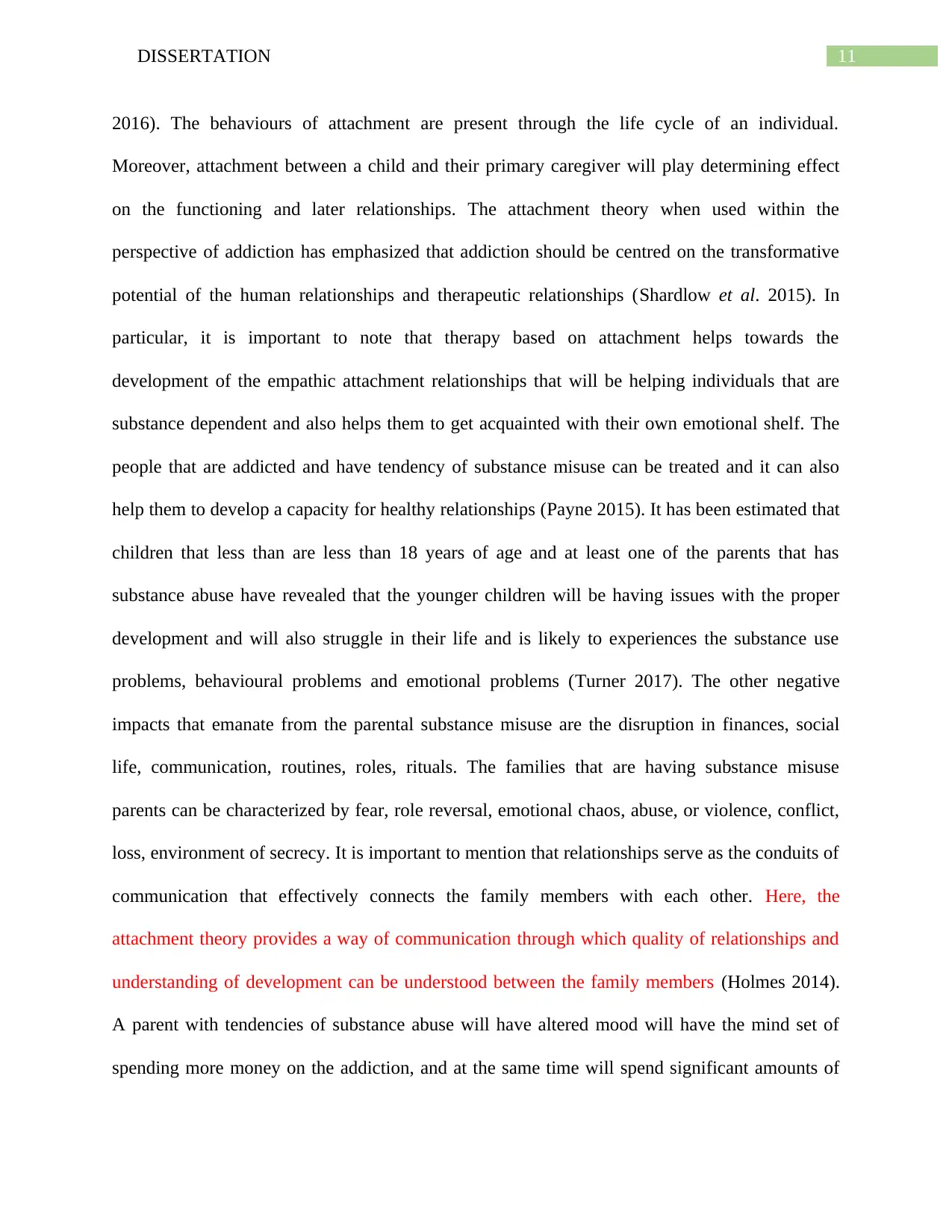
11DISSERTATION
2016). The behaviours of attachment are present through the life cycle of an individual.
Moreover, attachment between a child and their primary caregiver will play determining effect
on the functioning and later relationships. The attachment theory when used within the
perspective of addiction has emphasized that addiction should be centred on the transformative
potential of the human relationships and therapeutic relationships (Shardlow et al. 2015). In
particular, it is important to note that therapy based on attachment helps towards the
development of the empathic attachment relationships that will be helping individuals that are
substance dependent and also helps them to get acquainted with their own emotional shelf. The
people that are addicted and have tendency of substance misuse can be treated and it can also
help them to develop a capacity for healthy relationships (Payne 2015). It has been estimated that
children that less than are less than 18 years of age and at least one of the parents that has
substance abuse have revealed that the younger children will be having issues with the proper
development and will also struggle in their life and is likely to experiences the substance use
problems, behavioural problems and emotional problems (Turner 2017). The other negative
impacts that emanate from the parental substance misuse are the disruption in finances, social
life, communication, routines, roles, rituals. The families that are having substance misuse
parents can be characterized by fear, role reversal, emotional chaos, abuse, or violence, conflict,
loss, environment of secrecy. It is important to mention that relationships serve as the conduits of
communication that effectively connects the family members with each other. Here, the
attachment theory provides a way of communication through which quality of relationships and
understanding of development can be understood between the family members (Holmes 2014).
A parent with tendencies of substance abuse will have altered mood will have the mind set of
spending more money on the addiction, and at the same time will spend significant amounts of
2016). The behaviours of attachment are present through the life cycle of an individual.
Moreover, attachment between a child and their primary caregiver will play determining effect
on the functioning and later relationships. The attachment theory when used within the
perspective of addiction has emphasized that addiction should be centred on the transformative
potential of the human relationships and therapeutic relationships (Shardlow et al. 2015). In
particular, it is important to note that therapy based on attachment helps towards the
development of the empathic attachment relationships that will be helping individuals that are
substance dependent and also helps them to get acquainted with their own emotional shelf. The
people that are addicted and have tendency of substance misuse can be treated and it can also
help them to develop a capacity for healthy relationships (Payne 2015). It has been estimated that
children that less than are less than 18 years of age and at least one of the parents that has
substance abuse have revealed that the younger children will be having issues with the proper
development and will also struggle in their life and is likely to experiences the substance use
problems, behavioural problems and emotional problems (Turner 2017). The other negative
impacts that emanate from the parental substance misuse are the disruption in finances, social
life, communication, routines, roles, rituals. The families that are having substance misuse
parents can be characterized by fear, role reversal, emotional chaos, abuse, or violence, conflict,
loss, environment of secrecy. It is important to mention that relationships serve as the conduits of
communication that effectively connects the family members with each other. Here, the
attachment theory provides a way of communication through which quality of relationships and
understanding of development can be understood between the family members (Holmes 2014).
A parent with tendencies of substance abuse will have altered mood will have the mind set of
spending more money on the addiction, and at the same time will spend significant amounts of
⊘ This is a preview!⊘
Do you want full access?
Subscribe today to unlock all pages.

Trusted by 1+ million students worldwide
1 out of 46
Related Documents
Your All-in-One AI-Powered Toolkit for Academic Success.
+13062052269
info@desklib.com
Available 24*7 on WhatsApp / Email
![[object Object]](/_next/static/media/star-bottom.7253800d.svg)
Unlock your academic potential
Copyright © 2020–2025 A2Z Services. All Rights Reserved. Developed and managed by ZUCOL.




